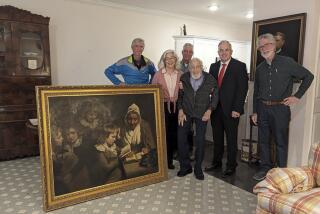Russian art loan reaches London after worries are eased
- Share via
LONDON -- From Russia, with qualms.
Works by Matisse, Van Gogh, Cezanne and other masterpieces from Russian museums are finally hanging in a London gallery after a last-minute legal change eased Moscow’s fears that the paintings could be seized in legal action if they traveled to Britain.
The Royal Academy of Arts’ blockbuster exhibition “From Russia” gathers 120 Impressionist and Post-Impressionist works -- many seized by the Soviet state after the 1917 Bolshevik Revolution.
The show, which took years to assemble, was canceled last month by Russian authorities, who said families of the paintings’ original owners might go to court to get them back while the artworks were in London.
The exhibition was saved when the British government agreed to rush into effect a law giving loaned foreign artworks immunity from seizure.
“It was a little bit of a cliffhanger from our point of view,” lead curator Norman Rosenthal said Tuesday, standing in front of Henri Matisse’s huge “Dance II,” an exuberant painting of naked five figures dancing hand in hand. “We didn’t have a backup plan.”
At the exhibition’s heart are paintings gathered by Russian collectors, Ivan Morosov and Sergei Shchukin. Rich textile merchants with a passion for French art, each amassed an extraordinary collection: Morosov owned 18 Cezannes, Shchukin more than 50 Picassos.
The works were seized by Vladimir Lenin for the Soviet state after the 1917 revolution, and the collectors’ descendants have led a long campaign for compensation. Shchukin’s grandson Andre-Marc Delocque-Fourcaud and Morosov’s great-grandson Pierre Konowaloff say they don’t want the paintings back but do want acknowledgment of their loss and financial compensation.
The two stood outside the museum Tuesday and spoke to reporters coming to review the exhibit.
“We are not enemies of the Royal Academy,” said Delocque-Fourcaud, 66, who traveled to London from his home in France. “We didn’t want to jeopardize the exhibition” -- which they say has drawn new attention to the families’ cause.
The works run from 19th century Russian realism through French innovators like Cezanne, Renoir, Gauguin, Matisse and Picasso to the experimental Russian and Soviet artists inspired by them: Marc Chagall, Vassily Kandinsky, Kazimir Malevich and others.
Rosenthal, whose Jewish parents came to Britain as refugees from Nazi-occupied Europe, said of the ownership dispute: “I think history is history and we have to live with the consequences of history. In 1917, the Russian Revolution took place and, for better or for worse, we can’t turn the clock back.”
More to Read
The biggest entertainment stories
Get our big stories about Hollywood, film, television, music, arts, culture and more right in your inbox as soon as they publish.
You may occasionally receive promotional content from the Los Angeles Times.










